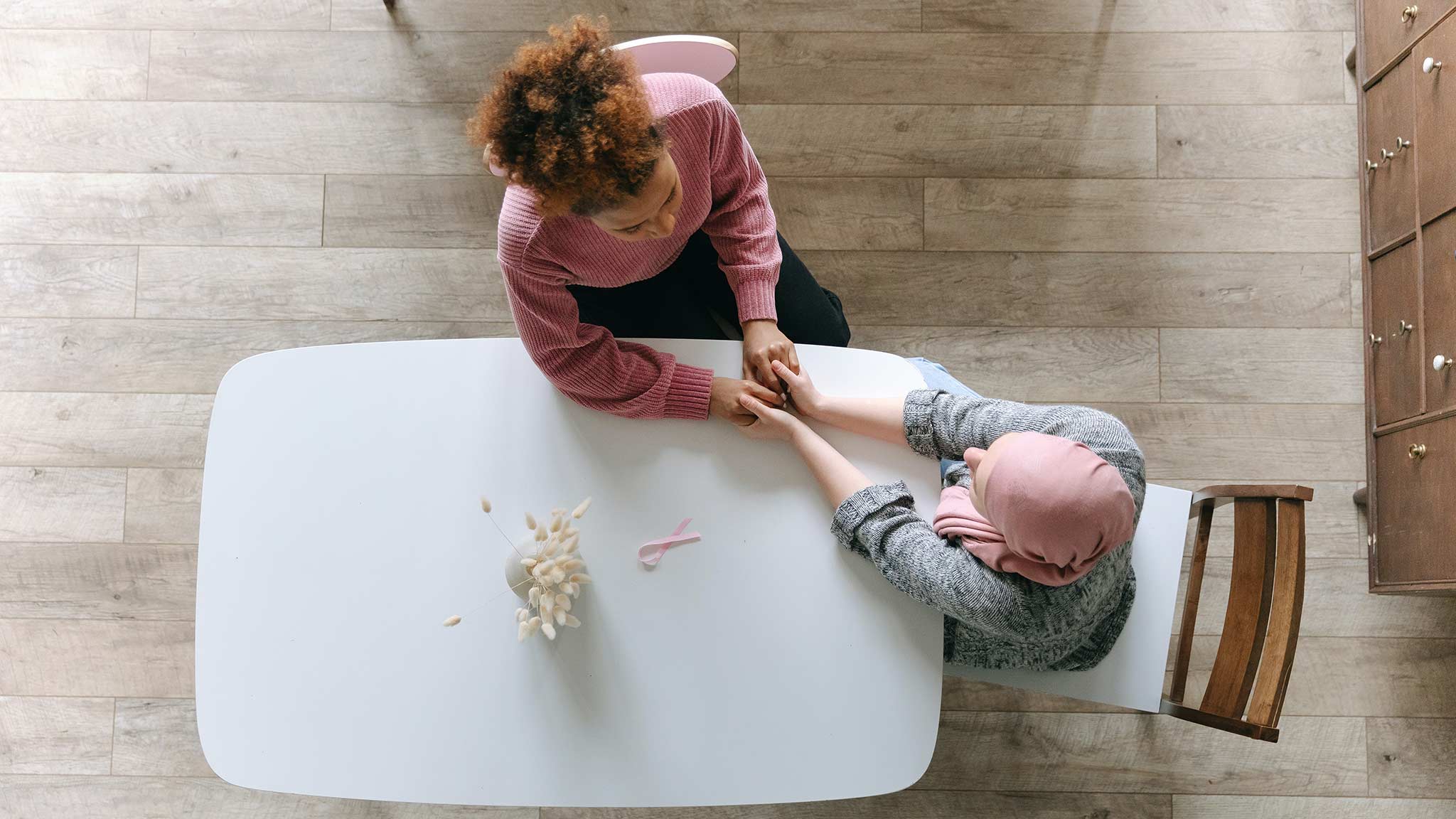Caregiver Loneliness: Why Self-Care Is Important, Too

Caregiving is one of the most important yet isolating jobs on the planet and because working as a caregiver requires you to put someone else first and yourself second, it’s easy to neglect your own emotional (and even physical) needs.
- The physical, emotional, and mental exhaustion associated with full-time care can lead to loneliness in caregivers, which can also coincide with depression.
- When you’re working as a caregiver, someone else’s life and needs are a priority but yours still have to be, too.
- Self-care can often feel like more effort than you’re able to give but you must do it — for yourself, and for the person you’re caring for.
- The emotional toll of caregiving is often overlooked, which is why caregivers may feel invisible and even unrecognized for their efforts, despite doing some of the most important work in the world.
Struggling with loneliness or having a mental health crisis?
- Suicide Prevention Lifeline: 1-800-273-TALK (8255); Deaf or hard of hearing dial 711 before the number or connect via online chat
Caregiving requires an incredible amount of patience and forbearance, causing the caregiver to put themselves second to someone else’s every need.
Child and elder care are some of the most common forms of caregiving, but a caregiver is anyone who is emotionally and/or physically responsible for another human who cannot care for themselves without help.
I worked with children for a decade and have firsthand experience as a caregiver.
I can relate to the struggle, intimately.
It is difficult work that is rewarding yet exhausting at the same time — and it is often thankless.
Especially if you don’t have people to relate to, you’re left feeling completely alone in your emotional exhaustion while serving as a caregiver.
Why Are Caregivers Prone To Loneliness?

When I first moved to New York City, I worked as a nanny for a nine-month-old baby in Harlem.
We spent every morning together, into the afternoon, and on Fridays, a few hours in Washington Square Park.
I learned a lot during my job as a caregiver — but it was a lonely experience, too.
When the baby cried, or I had to carry him and his clunky stroller up and down three flights of stairs, or when he needed another diaper change, or when he was causing typical baby shenanigans…all of those individual moments were a source of loneliness.
He required what felt like constant attention and care — because it was.
Since babies do not know how to communicate with words or control their emotions in ways that adults do, I would often feel underappreciated and exasperated.
It felt like I shifted my entire orbit of reality to revolve around this tiny human that couldn’t even say “Thank you” after I wiped his butt.
Additionally, I always had to be one step ahead, able to cope with his up and down moods and curiosities at a moment’s notice.
It was rewarding in many ways, of course, but it was exhausting — and that’s something many caregivers can relate to, no matter how old their wards.
Caregivers are prone to loneliness for a multitude of reasons, including:
- The physical, emotional, and mental exhaustion associated with full-time care
- Struggling with the weight of responsibility for another’s life
- Isolation when caring for someone who is homebound
- Feeling overwhelmed and underappreciated, particularly if the person being cared for is unable to speak or interact meaningfully
- Feeling like your efforts as a caregiver are futile
- Acting as the invisible glue holding another person’s life together and always worrying about their welfare
- Being unable to talk to or connect with others who can relate
Overseeing another’s life is, at its core, an extremely important responsibility.
I spoke to Gloria Cowdin, a former home-care provider for an elderly woman with dementia.
She shared a lot with me regarding her experience working as a caregiver and the loneliness it can cause.
“It definitely was weird to have to measure emotional labor,” she explained. “It’s like I’m being paid to care for this person…but I’m also actually caring for and about this person.”
“In many ways, it’s a social job,” she continued. “You are interacting with someone, but your interaction plays out on a very different level.”
Gloria told me that the woman she cared for was dealing with memory loss but had not come to terms with it.
“She was really high functioning and when I was there she would get really angry and want me to leave,” Gloria said.
“It took her a long time to remember that I was someone who was coming every day to see her and so she was always trying to host me.”
“I felt the most lonely when I kind of couldn’t put my finger on why I was there,” she admitted. Gloria continued:
“I think that’s a common theme for any caretaker — there are always going to be moments where it just feels like all of your efforts are futile and pointless and it’s like you just want to throw up your hands and be like, ‘I’m trying so hard and it’s like my efforts aren’t even being appreciated and no one even cares that I’m here.’
You’re holding everything together in a weird way. You have to make sure that when you leave, everything will be okay, and when you come back again the next time, everything will be ready for you to jump back in.”
“It’s like being the glue, to use a bad metaphor,” she observed. “But it’s an invisible glue.”
Expelling so much emotional labor can often leave you feeling like you’re running on empty, with no room left to take care of yourself.
Loneliness and isolation can affect caregivers in different ways, both mentally and physically.
Signs of loneliness in caregivers can include:
- Lack of self-care
- Heightened irritability
- Increased stress
- Mood swings
- Depression
- Exhaustion
- Declining physical health
- Loss of appetite or inability to eat (whether due to lack of time or loss of interest in food due to stress)
- Weight loss or gain
- Loss of interest in hobbies or activities they once enjoyed
- Absence from social activities
- Reliance on alcohol or drugs to cope with their feelings
Since working as a caregiver requires you to put yourself second and someone else first, it’s easy to fall into a pattern of forgetting to take care of yourself too.
Loneliness in caregivers can coincide with depression, making it hard to get out of bed and do the things needed to keep up with daily life.
When you’re working as a caregiver, someone else’s life and needs are a priority — but yours still have to be, too.
How To Deal With Loneliness As A Caregiver

The emotional labor it takes to be a caregiver is often overlooked, which is why caregivers often feel invisible and unrecognized in their efforts.
This is especially true when providing care to someone who is unable to respond to you.
What you are doing by serving as a caregiver for another is important work.
You are valued, even if it doesn’t feel like it some days.
I might be the first person to say it to you in weeks — or months — but that doesn’t make it any less true.
Although you’re focused on caring for someone else, you still need to make time to address your needs.
Even taking just five minutes for yourself to step outside and feel the sun on your face can help.
I know in some ways, self-care can feel like more effort than you are able to give beyond that which you are already giving, but you must do it — for yourself, and for the person you’re caring for.
Talk about it with someone who understands:
It’s extremely important to talk through your feelings of sadness, isolation, and loneliness if you’re a caregiver.
You might be surprised by how good it feels to talk about the unique mix of emotions attached to caregiving.
Gloria, the home-care provider I spoke with earlier, told me that the experience of caregiving “was isolating because it was really difficult to talk to people about it who hadn’t also experienced it.”
She turned to a friend — one who had referred her to the program she was involved with to provide home care.
“He and I would talk about it a lot because [caregiving] just is so isolating,” she explained.
“It feels really good just to have at least one person who you can vent to about the things that are so job-specific,” she said, adding that this could be applied to any job — not just caregiving.
Gloria said that working as a caregiver, in particular, is “so emotional and existential and that makes it even more isolating because there aren’t very many jobs that are similar to that.”
Finding someone who has been where you are — providing care for someone else — can be a wonderful emotional outlet that can help you to feel less alone.
In the absence of this, therapy or even talking to a trusted friend or family member is also a great way to get your thoughts and feelings out of your head.
Do something for just yourself, EVERY single day:
Taking the time to treat yourself to something special that is just for you will help remind you of your autonomy.
Going to your favorite restaurant, enjoying a relaxing bubble bath, or going on a stroll to the park by yourself are all ways to help soothe yourself and feel a bit better.
That can be easier said than done, however, especially if you’re providing care in a situation where you have little-to-no relief from your duties.
Self-care does not have to be elaborate, or even time-consuming.
As I mentioned earlier, just taking five minutes to stand outside in the sun, breathing fresh air, provides a welcome respite that can lift your mood and invigorate your soul.
You need to make time to do even the smallest acts of self-care whenever you can.
If you’re unable to take a long bath, sometimes a five-minute shower under hot water can be enough.
Putting on fresh clothing afterward can help you to at least feel human again.
If you can’t go out to your favorite restaurant, order takeout and have it delivered to your doorstep.
It might cost a little extra with the delivery fee, but you’re worth this small extravagance.
You are worth the self-care.
If you can arrange for relief — to have someone step into your role for a few hours just so you can get out of the house — try to do this now and again.
The act of running small errands, such as running to the grocery store or even just catching a movie in a theater, can bring a sense of socialization that you likely didn’t even know you were missing.
Being immersed in someone else’s life can make us forget how long it’s been since the last time we went out and did…well, anything.
Not everyone’s situation can allow for relief in this way, but if yours does, this can be an important act of self-care.
You’re not neglecting your duties as a caregiver if you take a little time for yourself now and again.
If anything, caring for yourself will enable you to be a better caregiver.
Closing Thoughts
Caregiver loneliness can be difficult to cope with, especially if you are alone in your role as a caregiver or you’re feeling overwhelmed and underappreciated.
Whether you’re a single mom or dad, the caretaker for a parent or disabled family member, or a person paid to care for someone else, caregiving is an emotional and vulnerable job.
The routine advice given every time you board an airplane — “put your oxygen mask on first before helping others” — is an important analogy that fits the situation.
While serving as a caregiver, make sure you’re providing care to yourself, too.
Editor’s Note: This article is part of The Roots Of Loneliness Project, the first-of-its-kind resource that comprehensively explores the phenomenon of loneliness and over 100 types we might experience during our lives.
Find Help Now
If you’re struggling with caregiver loneliness, we’ve put together resources to meet you wherever you are — whether you want someone to talk to right now, or are looking for longer-term ways to help ease your loneliness.
- Suicide Prevention Lifeline: 1-800-273-TALK (8255); Deaf or hard of hearing dial 711 before the number or connect via online chat
- Resources & Emotional Support For Loneliness
- Volunteer & Pet Adoption Opportunities






